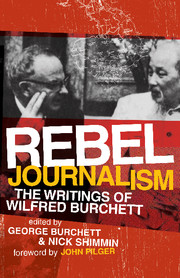Book contents
- Frontmatter
- Contents
- List of Photographs
- Acknowledgements
- Foreword by John Pilger
- Foreword by Gavan McCormack
- Introduction
- 1 The Atomic Plague [1945]
- 2 With Mick Griffith to the Plaine des Lacs [1941]
- 3 Who is Wingate Anyway? [1944]
- 4 The Trial of Cardinal Mindszenty [1951]
- 5 Liberty in Eastern Europe [1951]
- 6 The Microbe War [1953]
- 7 Koje Unscreened [1953]
- 8 The Ball-Point Pen Murders [1954]
- 9 South of the 17th Parallel [1955]
- 10 Front-Line Village [1959]
- 11 Welcome Home [1961]
- 12 Gagarin: The First Interview with Western Journalists [1961]
- 13 Virgin Lands [1962]
- 14 Lilac and Outer Space [1962]
- 15 War Against Trees [1963]
- 16 The Tragedy of South Vietnam's Ethnic Minorities [1964]
- 17 Interview with General Vo Nguyen Giap (April 13, 1964)
- 18 A Fortified Hamlet [1965]
- 19 Patriots & Mercenaries [1965]
- 20 At Ground Level [1966]
- 21 A Spurned Olive Branch [1967/1977]
- 22 Personal Leader [1968]
- 23 The Tet of Peace [1973/1977]
- 24 ‘Something from Nothing’ Township [1976]
- 25 Evaluating the Past [1976]
- 26 Mercenaries: British Export Model [1977]
- 27 The Geneva Conference [1978]
- 28 How to be a Good Khmer Rouge [1981]
- 29 China Prepares to Attack Vietnam [1981]
- 30 Afterword [1983]
- Notes
- Bibliography
- Index
4 - The Trial of Cardinal Mindszenty [1951]
Published online by Cambridge University Press: 22 September 2009
- Frontmatter
- Contents
- List of Photographs
- Acknowledgements
- Foreword by John Pilger
- Foreword by Gavan McCormack
- Introduction
- 1 The Atomic Plague [1945]
- 2 With Mick Griffith to the Plaine des Lacs [1941]
- 3 Who is Wingate Anyway? [1944]
- 4 The Trial of Cardinal Mindszenty [1951]
- 5 Liberty in Eastern Europe [1951]
- 6 The Microbe War [1953]
- 7 Koje Unscreened [1953]
- 8 The Ball-Point Pen Murders [1954]
- 9 South of the 17th Parallel [1955]
- 10 Front-Line Village [1959]
- 11 Welcome Home [1961]
- 12 Gagarin: The First Interview with Western Journalists [1961]
- 13 Virgin Lands [1962]
- 14 Lilac and Outer Space [1962]
- 15 War Against Trees [1963]
- 16 The Tragedy of South Vietnam's Ethnic Minorities [1964]
- 17 Interview with General Vo Nguyen Giap (April 13, 1964)
- 18 A Fortified Hamlet [1965]
- 19 Patriots & Mercenaries [1965]
- 20 At Ground Level [1966]
- 21 A Spurned Olive Branch [1967/1977]
- 22 Personal Leader [1968]
- 23 The Tet of Peace [1973/1977]
- 24 ‘Something from Nothing’ Township [1976]
- 25 Evaluating the Past [1976]
- 26 Mercenaries: British Export Model [1977]
- 27 The Geneva Conference [1978]
- 28 How to be a Good Khmer Rouge [1981]
- 29 China Prepares to Attack Vietnam [1981]
- 30 Afterword [1983]
- Notes
- Bibliography
- Index
Summary
After his World War II reporting, crowned by his Hiroshima scoop, Burchett returned to London. Daily Express editor Arthur Christiansen suggested he work in the editorial department of the paper, but Burchett wanted to avoid this at all costs. Eventually, the Express sent him on assignment in Berlin where he arrived ‘late on a freezing New Year's Eve 1945’.
The gloom of post-war Berlin never quite lifted for him during the three years he reported from there. He wrote ‘Was it so impossibly naïve to think in terms of a “new world” arising out of the ashes of World War II? It did not seem so at the time.’ But instead he observed a steady deterioration of relations between the Western powers and the Soviet Union, leading to a Cold War, if not World War III. As a witness to the devastation of Hiroshima, this appalled him.
In April 1949 Burchett moved his base to Budapest. He found his ideal of a ‘new world’ and ‘more equitable social order’ in the countries in the Soviet sphere of influence, the ‘Peoples’ Democracies’ of Czechoslovakia, Hungary, Poland and Bulgaria – and, to some extent, in Tito's Yugoslavia. Here, anti-fascist popular fronts had taken over from fascist dictatorships, helped by the Red Army. Although material conditions were tough, he found a ‘new spirit’ among the workers, peasants and intellectuals who were enthusiastically rebuilding their war-devastated countries.
Peoples’ Democracies, published in 1951, is an account of his travels in these countries and the political trials in Hungary and Bulgaria which he reported for the Daily Express and The Times. An optimistic assessment of the new socialist order emerging in Eastern Europe after the devastation of World War II, the gist of the book was that the young Peoples’ Democracies were under permanent threat from the Anglo-American alliance, which was plotting to overthrow the new regimes to return to power the old capitalist and land-owning classes supported by the reactionary clergy. Tito played a devious role: his agents had infiltrated the ranks of the Communist parties in the Peoples’ Republics to wrench them away from the Soviet bosom and back into the Anglo-American orbit. In other words, Burchett had swallowed the Stalinist line and happily parrots it in a book that, to this day, is used by his critics to present him as a Stalinist hack.
- Type
- Chapter
- Information
- Rebel JournalismThe Writings of Wilfred Burchett, pp. 31 - 43Publisher: Cambridge University PressPrint publication year: 2007



